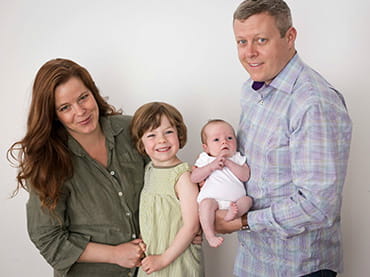The Challenge: Unable to Think Straight
Shelagh, 42, led a busy life as a university professor in Toronto, Canada. She worked hard to manage her many roles as wife, mom, architect, urban planner, and respected faculty member.
So, it was rare when Shelagh fell ill in April 2017.
Late one night, while helping her daughter who had woken up, Shelagh collapsed and struck her head on the bathroom sink.
After 2 days of headaches, doctors admitted her to the hospital where she learned she had meningitis. She was in the hospital for 2 weeks to treat it.
All the while, she recalled not feeling right.
“There's something really wrong with me, I cannot think straight," recalls Shelagh.
She started having intense headaches almost right after hitting her head.
But because of her severe meningitis, it was almost 7 months before doctors realized Shelagh was also struggling with concussion symptoms.
Shelagh's Path to the UPMC Sports Medicine Concussion Program
After Shelagh struck her head, she started having common concussion symptoms like:
- Light and noise sensitivity
- Shortened attention span
- Memory loss
- Loss of interest in activities and hobbies
- Headaches
While Shelagh made a full recovery from meningitis, she continued to suffer significant symptoms from her concussion. She met routinely with a neurologist in Canada to help, but her symptoms didn't improve.
“It was debilitating for me to not have an idea, to not have any interest in anything. I couldn't read or even recall anything I had read. And to be aware of my disinterest and isolation was awful. Mentally, socially…it's a deep dark place down there. I thought I would never teach or research again," Shelagh says.
Thankfully, Shelagh's colleague suggested that she reach out to the UPMC Sports Medicine Concussion Program.
The Solution: A Trip to Pittsburgh for Concussion Treatment
Shelagh took her colleague's advice and contacted Michael “Micky" Collins, PhD, director of the UPMC Sports Medicine Concussion Program.
After learning about her case, Dr. Collins asked if Shelagh could come to Pittsburgh for an evaluation at UPMC.
Because of her severe light and noise sensitivities, Shelagh chose to drive from Toronto to Pittsburgh rather than fly.
Upon meeting with Dr. Collins and sharing her symptoms, he diagnosed Shelagh with a vestibular/ocular concussion.
“To hear there were 6 different types of concussions and how each type uniquely interacts with symptoms was surprising. I had never heard that before, despite my treatment elsewhere.” — Shelagh
Dr. Collins worked with Shelagh to tailor a treatment plan that was specific to her condition. It included exercises to strengthen and improve Shelagh's ocular and vestibular system.
Though her treatment was challenging at first, Shelagh remained committed to the process. And, while not always easy, the hard work paid off. She noticed improvements within weeks.
“It was the exact opposite of what anyone had ever told me, " Shelagh recalls. “Hearing there was something I could do to get better rather than just relax, wait, and hope resonated with me."
The Results: A Full Return to the College Classroom
Shelagh first visited the UPMC Sports Medicine Concussion Program in November 2017.
By late January 2018, she was able to go to a restaurant for dinner — something she couldn't do since before her injury. At that point, she knew that she was on her way to a full recovery.
Shelagh has since returned to teaching. She credits Dr. Collins and UPMC for giving her the hope and support she needed to take back her life.
She's also a proud advocate of the UPMC Sports Medicine Concussion Program's research.
“Just because everyone is saying to do it one way, doesn't mean it's the right and only way. We're learning so much about the human brain all the time. Seek out something that is getting amazing results," Shelagh says.
Shelagh recalls her last visit at the clinic with Dr. Collins. She had overcome so many setbacks and struggles during her recovery.
At times, she didn't know if she'd ever get back to feeling like she did before her injury.
But her hard work and commitment to her treatment plan proved that she could return to her former self.

















